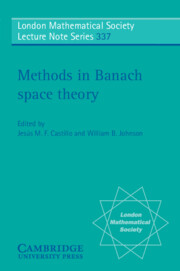Preface
Published online by Cambridge University Press: 04 May 2010
Summary
In the end, mathematics is what matters. In addition to the contributors to this volume of proceedings, the Conference included talks by C. Benítez, F. Cobos, P. Domanski, G. Godefroy, W. B. Johnson, A. Molto, J. P. Moreno, P. L. Papini and R. Phelps among the main speakers, and Julio Flores, Yves Raynaud, F. Naranjo, José Orihuela, Pedro Martín, I. J. Cabrera, V. Montesinos, P. Hájek, Luis Oncina, G. Gruenhage, Fernando García, Vassilis Kanellopoulos, I. Villanueva, P. Bandyopadhyay, Sebastian Lajara, Diego Yañez, David PérezGarcía, C. Michels, Bernardo Cascales, Pandelis Dodos, Antonio Pulgarín, M. Muñoz, José Rodríguez, Luz M. Fernández-Cabrera, Carmen Calvo, Juan Casado, Belmensnaoui Aqzzouz, Redouane Nouira, Antonio Martínez, Fernando Mayoral, Maria del Carmen Calderón Moreno, LuizaAmália de Moraes, J. A. Prado Bassas, My Hachem Lalaoui Rhali, Houcine Benabdellah, Rachid El Harti, Michael Stessin among the shorter talks.
The conference was organized, like this proceedings volume, in five sections,
Geometrical methods
Homological methods
Topological methods
Operator theory methods
Function space methods
The idea was to organize Banach space theory (and related categories) according to the methods used to approach problems. Of course, the methods can overlap, and (fortunately) usually do, but typically one of the methods sticks out. This proceedings volume has been organized accordingly; so, in each of its five sections the reader will encounter survey and research papers describing the state-of-the-art in each of those areas. All together the sixteen papers depict a rather attractive panorama of modern infinite dimensional Banach space theory.
- Type
- Chapter
- Information
- Methods in Banach Space Theory , pp. vii - viiiPublisher: Cambridge University PressPrint publication year: 2006

